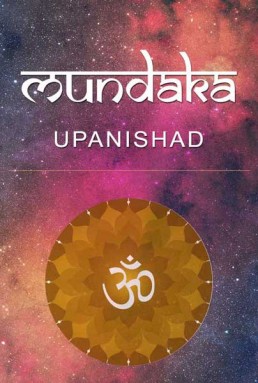भुवनस्य गोप्ता । स ब्रह्मविद्यां सर्वविद्याप्रतिष्ठामथर्वाय
ज्येष्ठपुत्राय प्राह ॥ १॥
bhuvanasya goptā . sa brahmavidyāṃ sarvavidyāpratiṣṭhāmatharvāya
jyeṣṭhaputrāya prāha .. 1..
Mundaka Upanishad Introduction
Mundaka Upanishad Invocation
Mundaka 1 – Chapter 1 – Verse 1
Mundaka 1 – Chapter 1 – Verse 2
Mundaka 1 – Chapter 1 – Verse 3
Mundaka 1 – Chapter 1 – Verse 4
Mundaka 1 – Chapter 1 – Verse 5
Mundaka 1 – Chapter 1 – Verse 6
Mundaka 1 – Chapter 1 – Verse 7
Mundaka 1 – Chapter 1 – Verse 8
Mundaka 1 – Chapter 1 – Verse 9
Mundaka 1 – Chapter 2 – Verse 1
Mundaka 1 – Chapter 2 – Verse 2
Mundaka 1 – Chapter 2 – Verse 3
Mundaka 1 – Chapter 2 – Verse 4
Mundaka 1 – Chapter 2 – Verse 5
Mundaka 1 – Chapter 2 – Verse 6
Mundaka 1 – Chapter 2 – Verse 7
Mundaka 1 – Chapter 2 – Verse 8
Mundaka 1 – Chapter 2 – Verse 9
Mundaka 1 – Chapter 2 – Verse 10
Mundaka 1 – Chapter 2 – Verse 11
Mundaka 1 – Chapter 2 – Verse 12
Mundaka 1 – Chapter 2 – Verse 13
Mundaka 2 – Chapter 1 – Verse 1
Mundaka 2 – Chapter 1 – Verse 2
Mundaka 2 – Chapter 1 – Verse 3
Mundaka 2 – Chapter 1 – Verse 4
Mundaka 2 – Chapter 1 – Verse 5
Mundaka 2 – Chapter 1 – Verse 6
Mundaka 2 – Chapter 1 – Verse 7
Mundaka 2 – Chapter 1 – Verse 8
Mundaka 2 – Chapter 1 – Verse 9
Mundaka 2 – Chapter 2 – Verse 10
Mundaka 2 – Chapter 2 – Verse 1
Mundaka 2 – Chapter 2 – Verse 2
Mundaka 2 – Chapter 2 – Verse 3
Mundaka 2 – Chapter 2 – Verse 4
Mundaka 2 – Chapter 2 – Verse 5
Mundaka 2 – Chapter 2 – Verse 6
Mundaka 2 – Chapter 2 – Verse 7
Mundaka 2 – Chapter 2 – Verse 8
Mundaka 2 – Chapter 2 – Verse 9
Mundaka 2 – Chapter 2 – Verse 10
Mundaka 2 – Chapter 2 – Verse 11
Mundaka 3 – Chapter 1 – Verse 1
Mundaka 3 – Chapter 1 – Verse 2
Mundaka 3 – Chapter 1 – Verse 3
Mundaka 3 – Chapter 1 – Verse 4
Mundaka 3 – Chapter 1 – Verse 5
Mundaka 3 – Chapter 1 – Verse 6
Mundaka 3 – Chapter 1 – Verse 7
Mundaka 3 – Chapter 1 – Verse 8
Mundaka 3 – Chapter 1 – Verse 9
Mundaka 3 – Chapter 1 – Verse 10
Mundaka 3 – Chapter 2 – Verse 1
Mundaka 3 – Chapter 2 – Verse 2
Mundaka 3 – Chapter 2 – Verse 3
Mundaka 3 – Chapter 2 – Verse 4
Mundaka 3 – Chapter 2 – Verse 5
Mundaka 3 – Chapter 2 – Verse 6
Mundaka 3 – Chapter 2 – Verse 7
Mundaka 3 – Chapter 2 – Verse 8
Mundaka 3 – Chapter 2 – Verse 9
Mundaka 3 – Chapter 2 – Verse 10
Mundaka 3 – Chapter 2 – Verse 11
Mundaka 3 – Chapter 2 – Verse 12

Sri Shankara’s Commentary (Bhashya) translated by S. Sitarama Sastri
The word “Brahma” means “much grown,” “great”, as excelling all others in virtue, knowledge, freedom from desires and power. The word Devanam means Indra and others, literally, those possessing “enlightenment.” The word ‘Prathama’ means “preeminent by attributes” or “at first.” Sambahhava means “became manifest well,” i.e., of free choice not like mortals who are born in Samsara, in consequence of their good and bad deeds; for, the Smriti says “He who is beyond the reach of the senses and cannot be grasped, etc.” Visvasya means “of the whole universe.” Karta, ‘creator Bhuvanasya, ‘of the world’ so created; gopta, ‘protector the epithets for Brahma are for eulogising the knowledge. He, i.e., Brahma whose greatness is thus celebrated. Brahma Vidyâm, ‘knowledge of the Brahman or the Paramatmam’ because it is described as knowledge ‘by which one knows the undecaying and the true Purusha that knowledge is of the Paramatman; or Brahma vidya may mean “knowledge taught by Brahma the first born.” Savva vidya pratishtam means “that on which all knowledge rests for support”; because it is the cause of the manifestation of all other knowledge; or, it may he, because the one entity to he cognized by all knowledge is only known by this; for the Sruti says “by which, what is not heard becomes heard; what is not thought of becomes thought of; and what is not known becomes known.” The expression “on which all knowledge depends” is also eulogy. He taught this knowledge to his eldest son; as Atharva was created at the beginning, in one of the numerous creations made by Brahma, he is said to be his eldest son. To him, his eldest son, he taught.
Mundaka Upanishad – Verse 1 – Mundaka-1-1-1-oṃ brahmā – In Sanskrit with English Transliteration, Meaning and Commentary by Adi Shankaracharya (Sankara Bhashya) – Mundaka-1-1-1
